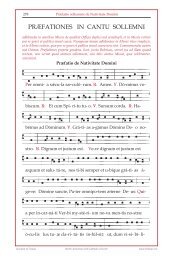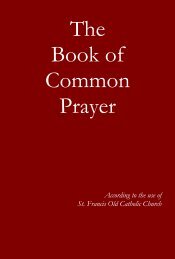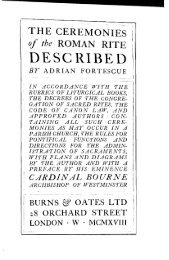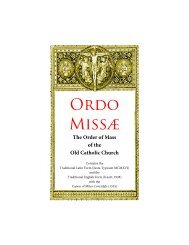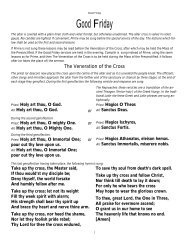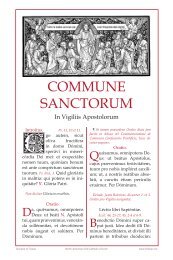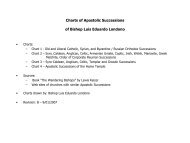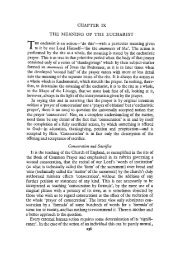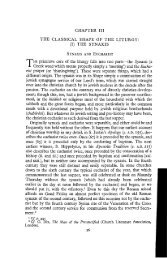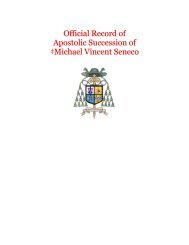Eucharist and Lord's Supper
Eucharist and Lord's Supper
Eucharist and Lord's Supper
You also want an ePaper? Increase the reach of your titles
YUMPU automatically turns print PDFs into web optimized ePapers that Google loves.
72 THE SHAPE OF THE LITURGY<br />
jewish historian used terms with which we have been made familiar by<br />
more than one modern Anglican bishop. He spoke for once not out of his<br />
historian's insight into the first century, but out of a deep prejudice which<br />
characterised nineteenth century thought in general, in which he had<br />
grown up. This assumed a discontinuiLj between 'matter' <strong>and</strong> 'spirit' so<br />
absolute that 'dead matter can never become the vehicle of spiritual<br />
reality'.<br />
Such a dualism was utterly remote from the thought of the first century,<br />
both jewish <strong>and</strong> hellenistic. 1 The sacramentalism of primitive christianity<br />
became undeniably plain to liberal theologians more than fifty years ago.<br />
The Old Testament was then being misread as a fundamentally Lutheran<br />
document by an altogether one-sided emphasis on its prophetic element,<br />
under the influence of German theology, even by leading Anglican<br />
scholars;2 while the other jewish evidence was grossly neglected (despite<br />
the labours of individual scholars like R. H. Charles). In the circumstances<br />
it seemed a reasonable process to attribute the origin of the christian sacraments<br />
to 'early pagan infiltrations' from the hellenistic mystery-cults, in<br />
which sacramentalism was supposed to have flourished. And S. Paul, by<br />
the accident that he was born at Tarsus (<strong>and</strong> despite his pharisaic training<br />
at Jerusalem) was available as a target for the accusation that 'though<br />
ready to fight to the death against the Judaising of Christianity, he was<br />
willingto take the first step, <strong>and</strong> a long one, towards the Paganising of it.'3<br />
The alleged parallels between primitive christian <strong>and</strong> contemporary<br />
pagan sacramentalism have in fact reduced themselves to unimpressive<br />
proportions under recent investigation. But Meyer as an historian, in the<br />
sentence quoted above, might also have reflected th¥t there could have<br />
been no absolute historical impossibility that Jesus the jew ever uttered<br />
such a thought, if only because many contemporary jews of a certain<br />
spiritual intelligence-including the incurably rabbinic Saul of Tarsusthoroughly<br />
believed that He had. We have seen that the historical evidence,<br />
critically treated, in no way compels the belief that He did not utter it. On<br />
the contrary, it establishes what I would venture to call the certainty that<br />
the story that He did so did not originally proceed from a hellenistic source<br />
at all. Whether it be true or false, it comes as it st<strong>and</strong>s from a rigidly <strong>and</strong><br />
above all an entirely unselfconsciously<strong>and</strong> traditionally jewish background,<br />
which can hardly be other than the early Jerusalem church, with its nucleus<br />
of Galilaean discipleswho had actually been present at the supper.<br />
1 On the 'emphatically <strong>and</strong> radically non-dualistic' character of jewish thought<br />
'even to excess', <strong>and</strong> the 'rudimentary <strong>and</strong> germinal sacramentalism' which 'not only<br />
existed but flourished as an essential part of the jewish religion, from the O.T. into<br />
Rabbinism', cf. the very valuable first lecture of F. Gavin, The Jewish Antecedents of<br />
the Christian Sacraments, London, 1928.<br />
2 E.g. Gore, in denying the existence of a jewish sacramentalism (The Holy<br />
Spirit <strong>and</strong> the Church, p. 92) is merely echoing Bousset, Die Religion des Judemums<br />
in spathellenistischerZeitalter, pp. 199 sq. without independent investigation.<br />
3 W. R. Inge, Outspoken Essays (1st Series), p. 228.



